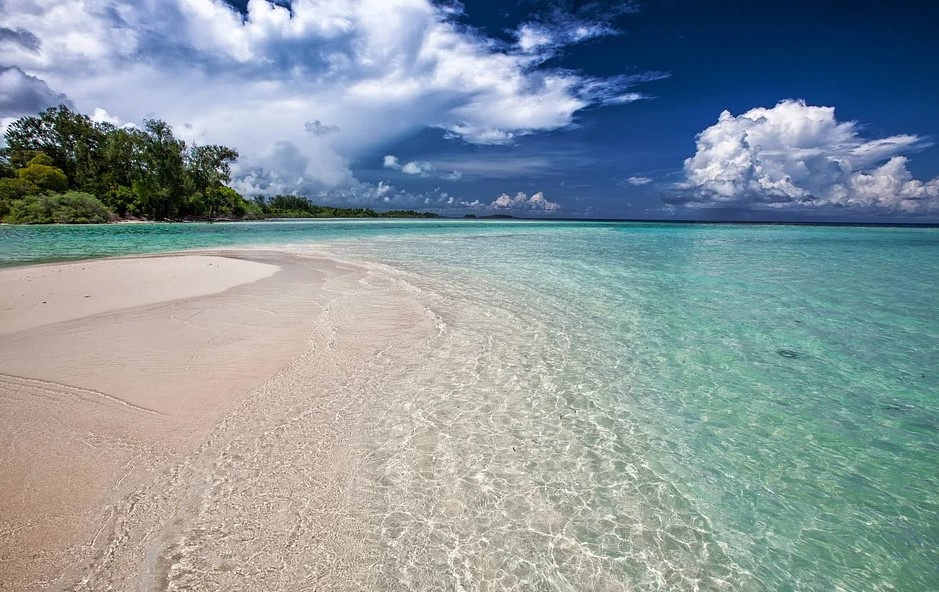Papua is not only beautiful, but also has delicious food tour. This refers to the culinary tour which is fresh and tongue-in-cheek. Kapotar Island is a small white sandy island, located in Mambor Village, Moora Islands District, Nabire Regency, Papua. This beautiful island is used as a food barn island, the waters are a place to look for marine products, the land is a place for gardening, hunting moles and maleo birds and taking other forest products.
The people of Mambor themselves live on Mambor Island, south of Kapotar Island. There is a saying on Mambor Island, ‘the fish has not been dead for an hour and has been eaten’. That’s because the fish are still fresh, selectively caught, only large fish or consumption size, fishing results, balobe or catching fish at night when the tide is low, small fish are released, left and not taken, caught on the spot, on the beach cleaned , go home immediately fried, burned or cooked in yellow gravy.
The seasoning is very simple, only use orange juice and salt. Meanwhile, the yellow gravy fish, added with turmeric as a flavoring and coloring agent, served with papeda. Papeda is made from sago starch plus enough lime juice and then doused with hot water.
Unlike the fish in the city, it can be ascertained that it has been dead for days and stored in the refrigerator, certainly not fresh anymore and of course the taste is different. Culinary on Mambor Island, very distinctive, comes from the garden, very fresh, only harvested when it is about to be cooked, taken in moderation, pick it again tomorrow. Plants are left alone but thrive. Vegetables, fruits and tubers are still fresh, cooked using firewood.
There is a unique way to soften the octopus or squid, when cleaned, they are beaten on the beach sand using a banana stem, guaranteed when cooked, the octopus or squid are not tough. Octopus or squid cooked in bamboo. The bamboo is then heated on coals.
The typical cuisine of Mambor Island is bananas and taro cooked in coconut milk. How to cook bananas and taro, namely horn bananas and taro boiled using coconut milk with salt seasoning, boiled until the coconut milk runs out. It’s very tasty.
This menu is served with stir-fried papaya leaves. Even though it is made from papaya leaves, it is guaranteed not to be bitter. How to cook papaya leaves so that they are not bitter, the typical recipe of Mambor mamas is when sautéing, garlic and onion are put in hot coconut oil, then papaya leaf vegetables are added, without adding salt.
Coconut oil has become a stir-fry seasoning with a fragrant aroma and savory taste, even without salt. It turns out that it is salt that makes papaya vegetables bitter. Another recipe so that papaya leaves are not bitter, sauteed papaya leaves with melinjo leaves, gedi leaves, pumpkin shoots, katuk leaves and sago mushrooms, cooked without salt, using only coconut oil.
Saute it using homemade coconut oil. The fish is also fried in coconut oil. Other culinary, boiled sea shells, other shellfish preparations are cooked in bamboo. The scallops are broken, the meat is taken, then the mussel meat is put in bamboo, and heated in hot coals.
There are even instant clams, which is a type of shellfish that can only be found in a saltwater lake in the middle of Kapotar Island, the clams are doused in hot water, left for a while, eaten immediately, the taste is very sweet, not fishy, for the people of Mambor it is used as a snack while waiting for the fish to be fried.
Another unique culinary is banana stick sky that is burned, eaten with raw old coconut, without being grated, old coconut is eaten immediately. It tastes sweet and savory banana old coconut.
Baked taro is also eaten directly with old coconut. Another culinary is dry sago flour mixed with sago caterpillars, wrapped in sago leaves and then heated on coals. The fat of the sago caterpillar will seep into the sago flour, giving it a distinctive, savory taste, even without any seasoning.
This natural recipe, makes the Mambor people live long, at the age of 60, they are still strong in gardening and fishing, even at that age, they can still read writing without wearing glasses.
–sh



